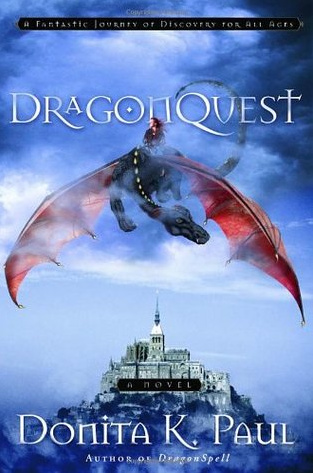

“There's nothing like a mission to save the world to liven up a vacation.”
― Donita K. Paul, quote from DragonQuest
“Well, what are we waiting for? ...She said 'children.' I bet that's anyone under a couple of centuries old. Let's go.”
― Donita K. Paul, quote from DragonQuest
“A mouse slid out from under his hat and scrambled down his sleeve, across his lap, and down to the floor.
Nothing,' said Fenworth, 'should distract from a wizard's dignity.”
― Donita K. Paul, quote from DragonQuest
“Fenworth nodded. "Yes, yes. Urgent, deadly, insidious. The world is in peril and we must rise against evil." The old wizard released the general and patted him on the shoulder. "Tea and cake first, don't you think?”
― Donita K. Paul, quote from DragonQuest
“Wouldn't it be most logical for her to change herself into a living thing, like a cat or dog, a bird or mouse?'
That would be the easiest transformation, but Risto is above doing something simple.'
Still, I'd be happier if Dibl would quit eating those bugs. Dibl, stop it. You might eat Gilda.”
― Donita K. Paul, quote from DragonQuest

“Fenworth owned a world-famous library. More rooms held books than beds. Pillows stuffed in niches and comfortable chairs scattered throughout each room offered abundant paces to curl up and read.”
― Donita K. Paul, quote from DragonQuest
“It's a wisdom that comes from seeing how things work. Things you want to happen always take a long time.' She pointed one little finger at the meech dragon and shook it in his face. 'You may read books and know bunches, but I have lived life longer than you.”
― Donita K. Paul, quote from DragonQuest
“Well then,' said Femworth as he came to his feet, 'let's go. Sounds like a delightful challenge before supper. Stimulate the appetite, or kill it. Interesting either way.”
― Donita K. Paul, quote from DragonQuest
“Because then you would know my strength in Wulder instead of discovering your own.”
― Donita K. Paul, quote from DragonQuest
“6 Thus says the LORD, the King of Israel and i his Redeemer, the LORD of hosts: j “I am the first and I am the last; besides me there is no god.”
― quote from Study Bible-ESV
“What you see determines how you interpret the world, which in turn influences what you expect of the world and how you expect the story of your life to unfold.”
― Sheena Iyengar, quote from The Art of Choosing
“To my daughter I will say, when men come, set yourself on fire.”
― Warsan Shire, quote from Teaching My Mother How to Give Birth
“Unsure how to find grace and security in the complex world we’ve inherited, we try to fill up the spaces in our children’s lives with stuff: birthday entertainments, lessons, rooms full of toys and equipment, tutors and therapists. But material pleasures can’t buy peace of mind, and all the excess leads to more anxiety—parents fear that their children will not be able to sustain this rarefied lifestyle and will fall off the mountain the parents have built for them.”
― Wendy Mogel, quote from The Blessing Of A Skinned Knee: Using Timeless Teachings to Raise Self-Reliant Children
“Happy endings are reserved strictly for the fiction shelves of bookstores”
― Holly Bourne, quote from Soulmates
BookQuoters is a community of passionate readers who enjoy sharing the most meaningful, memorable and interesting quotes from great books. As the world communicates more and more via texts, memes and sound bytes, short but profound quotes from books have become more relevant and important. For some of us a quote becomes a mantra, a goal or a philosophy by which we live. For all of us, quotes are a great way to remember a book and to carry with us the author’s best ideas.
We thoughtfully gather quotes from our favorite books, both classic and current, and choose the ones that are most thought-provoking. Each quote represents a book that is interesting, well written and has potential to enhance the reader’s life. We also accept submissions from our visitors and will select the quotes we feel are most appealing to the BookQuoters community.
Founded in 2023, BookQuoters has quickly become a large and vibrant community of people who share an affinity for books. Books are seen by some as a throwback to a previous world; conversely, gleaning the main ideas of a book via a quote or a quick summary is typical of the Information Age but is a habit disdained by some diehard readers. We feel that we have the best of both worlds at BookQuoters; we read books cover-to-cover but offer you some of the highlights. We hope you’ll join us.